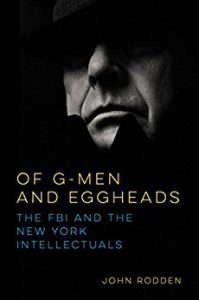 I am fascinated with paranoia – it intrigues me to no end to learn about irrationality and the lengths to which fear drives people. One of contemporary American history’s most notorious paranoiacs is, without a doubt, J. Edgar Hoover. The man behind the FBI never met a conspiracy he didn’t see behind every corner… This fascinating treatise from the University of Illinois Press offers yet another set of proofs of Hoover’s paranoia in this tidy little analysis of the FBI’s treatment of three prominent left-wing intellectuals who were the lucky recipients of domestic oversight for decades.
I am fascinated with paranoia – it intrigues me to no end to learn about irrationality and the lengths to which fear drives people. One of contemporary American history’s most notorious paranoiacs is, without a doubt, J. Edgar Hoover. The man behind the FBI never met a conspiracy he didn’t see behind every corner… This fascinating treatise from the University of Illinois Press offers yet another set of proofs of Hoover’s paranoia in this tidy little analysis of the FBI’s treatment of three prominent left-wing intellectuals who were the lucky recipients of domestic oversight for decades.
John Rodden, author of Of G-Men and Eggheads, has published numerous books on the so-called “New York Intellectuals” – the group of writers and writing-adjacent liberal thinkers who tended toward Marxist-Socialist thought, while generally disavowing traditional Soviet-style Communism. The three subjects of Rodden’s current book fell firmly into this camp. Yet despite their fairly strong anti-Stalinist, anti-Communist theoretical and political leanings, all three were subject to domestic surveillance for decade after decade – primarily, it seems, because of misunderstandings of their positions or of an over-reliance on their early activities and group memberships without any attention to the actual philosophies they espoused in their writing. And if that wasn’t clear enough for you, let me try to say it another way: without any attempt to actually read what these three men wrote or understand what they actually stood for, they were deemed to represent a Communist ideological threat to national security, and therefore to “require” surveillance.
Sound familiar? Long before the Patriot Act was a gleam in the eye of domestic surveillance gurus, Hoover’s FBI was working to perfect the craft – albeit even more surreptitiously than the PA authorizes. But I digress…
The book provides a nice set-up to the time period and the “mentality” (if one can rightly even call it that) of Hoover and his G-Men. Each of the three intellectuals gets his own chapter, with details provided through what certainly appears to have been meticulous and impressively deep first-degree source research. I was familiar with the Trillings and vaguely so with Howe; Macdonald’s story was new to me though, and perhaps that is why I found it the most interesting. This is not a book for the casual reader; it reads much more like a doctoral dissertation than a novel. While the volume is slim, the writing is dense. But dense doesn’t mean difficult or problematic, it just means that it requires a more careful reading than many of the current non-fiction books deliver. Still, it was a very interesting look at a particularly timely point in American history. I tend to agree with the conclusion – there is much to learn from this period of recent history, and the lessons couldn’t be more relevant in the current political environment. Paranoia made a come back a number of years ago, and it certainly does not look like it will be going out of fashion any time soon… They say those who don’t learn from history are doomed to repeat it; it would certainly be a mistake to not learn from this particular lesson book.
I originally received this book as a review copy via NetGalley, but there were issues with the electronic file. I noted that in my aborted review, and was promptly contacted by the publisher (University of Illinois Press), who most generously (and expeditiously) forwarded a hard copy. Not only an impressive publishing house, but also impressive reader services…


 Jill-Elizabeth LinkedIn
Jill-Elizabeth LinkedIn



Leave a Reply